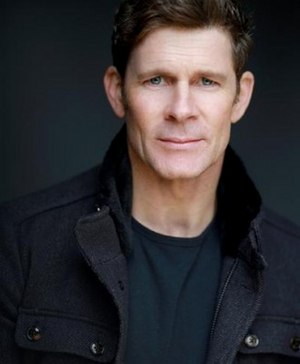Interview: George Asprey Talks THE LION KING

|
|

This October marks the 20th anniversary of The Lion King at London's Lyceum Theatre. Premiering way back in 1999, the show has entertained over 16 million people and remains the West End's bestselling stage production and the sixth-longest-running West End musical of all time.
To celebrate the show's roaring success (pardon the pun), BroadwayWorld spoke with George Asprey, who plays Scar, about being the villain and why he feels the show is still so well loved after all these years.
You often hear actors talking about how much more fun it is to play the villain than the hero. Is that the case with this role?
It's definitely more fun to play the villain. I think one of the main things with Scar is that he says things that everyone's thinking, but are too afraid to say. A friend of mine came up to me the other day, and what's joyous about The Lion King is that the show changes with how old you are. When he was younger, Scar was the scariest villain he'd ever seen, but now that he's older, he thinks he might have a point.
For someone who doesn't know the show, what can you tell us about Scar? Is he truly evil or just misunderstood?
The fact that he murders his brother and tries to murder his nephew pigeonholes him in the truly evil category, I would say. However, when you're playing a part, you have to think, where did this come from? What was his childhood like? Was he constantly oppressed by Mufasa? Is he striving for some warped sense of recognition?
Your nemesis Mufasa is played by Shaun Escoffery. Are the two of you friends outside of work, and if so, does this enhance the scenes you share?
Shaun and I joined The Lion King on exactly the same day and - put it this way - I have four sisters and I didn't realise I'd find a brother in a 6ft black guy from East London. We have such a close relationship offstage. We train in jujitsu together. We had children at pretty much the same time. And what it gives us onstage is trust and understanding. It allows us to monitor one another. If one of us is doing something differently, for example, we can talk to each other about it afterwards without any ambiguity. So 100% it helps us on stage.
What would you say the main challenges are for you in this role? Do you have to follow a strict fitness regime?
I don't know if I have to follow a strict fitness regime, but I do and I eat very healthily. Could I do it without? Yes, probably, but I think I'd be ill a lot more than I am and it would just make things more difficult. This job is hard enough without having other external problems created for you, so I do everything I can to mitigate those - and a strict diet and exercise regime is all part of that.
How do you go about putting your stamp on the character to make it your own?
I think any actor who plays what I would call famous parts, whether it's Macbeth or Hamlet, they're always going to put their own stamp on it - and Scar is no different. In fact, he's very Shakespearean in that respect. I don't know if there's anything I do on purpose, but a different actor will have different ideas. You bring different life experiences to the role. You have different styles of comedy. There's no definitive way to play a part - and thank goodness, otherwise one person would play it and everyone else might as well just give up.
There's a tour starting in Bristol now and the guy who plays Scar there will play it completely differently to me, and I think that's fantastic.
Have you seen a surge in new audiences since the recent live-action film at all?
To be honest, it would be pretty difficult to squeeze any more people in than we already have. We pretty much run to full capacity anyway. Certainly in my daily life outside of theatre, people are talking about The Lion King a lot more, and I think that can only help to raise the profile of our show. But we are talking about the biggest musical in the world, so to raise its profile any more would be pretty difficult!
I think one of the great things about the show is that people come back and see it again - I've seen it three times. What do you think makes it so well loved and still so popular all these years later?
What makes the show popular is a variety of things. Of course it's a fantastic story. It's a coming-of-age, it's a story of redemption, and then you have the fusions of theatrical styles. You have Chinese shadow puppetry, South African music and the extraordinary dance. Then you have a myriad of puppets. I think what brings people back again and again is the show grows with you. The show means different things to you at different stages of your life. It will mean a different thing to you at age nine to 19 to 29.
When I say The Lion King is a family show, I really mean it's a family show. It doesn't matter whether you're a grandmother, a parent, a child - there's something in it for you. There's also the humour. Some of it the adults will be chortling at and the kids will be wondering why, and of course there are moments where the children will be laughing, so I think it's a wonderful experience for the whole family.
You've done a great deal of film and television, but does theatre feel like a natural home to you? And what is it that drew you to doing The Lion King?
Playing Scar is one of those jobs that you hear about other actors doing and you never think you'll get to do it. I remember when I first auditioned something resonated with the part, which is slightly worrying seeing as he's an evil maniac. But something registered deeply and I understood it. It came very naturally to me and I find those are the roles that are most successful for an actor.
In terms of theatre, I love the immediacy of it. I love that feeling of agitation before you go on and that sense of excitement. Also when things go wrong, you can't just say "Cut" or "Can I do that again?". The audience can't turn you off and go and make a cup of tea. On both sides it's a continual process, and that brings a level of cohesion between the performer and the audience that you cannot get on screen.
Finally, for anybody who hasn't seen the stage production of The Lion King, what can they expect?
My wife came to see the show. She's a hardened pro, having played lead with the RSC, and after seeing it she came to me backstage and said she felt a slight sense of melancholy because she realised she'd never get to experience The Lion King for the first time again. I think that sums up more than anything I could say.
The Lion King is currently playing at the Lyceum Theatre
Photo credit: Faye Thomas
Videos
